|
Do you believe that your words matter? Sometimes, when viewing the massive number of available books, podcasts, blogs, TikToks, Reels, etc., I assume that my words are insignificant, that they only add to the cacophony around us without making an impact. When I start to feel like that though I find that I’m looking in the wrong direction. When I fall into thinking, “I don’t matter,” I realize that I’m forgetting whom I matter to. One of my favorite Bible verses is I Peter 4:11, “If anyone speaks, they should do so as one who speaks the very words of God.” (NIV) This is referring to those with the gift of speaking but I think also applies to those of us who have the freedom to share and speak or write to others as an ambassador of Christ. In some versions, the word oracles is used. An oracle is one through whom the gods speak. In writing to the believers of the early church, Peter is conjuring up imagery and wording that would have been familiar with this imagery. Peter is challenging believers to speak as though they are speaking God’s words. That’s quite the challenge! Too often we speak our own words acting like they are God’s words. We put our words in His mouth instead of putting His Word in our mouths.
Recently, I was discussing the web-like connectivity of the Bible. An example of this connectivity is the idea that we need God to be the foundation and sustainer of our lives. The Israelites were told to collect manna every day and that to only collect what they need for that day other than the Sabbath. Jesus alludes to this when he asks for daily bread (Matthew 6:11) as well as later when he tells his followers not to worry about tomorrow because today has enough troubles (Matthew 6:34). We can cast our cares on the Lord and He will sustain us (Psalm 55:22) like the wise man who built his house upon a rock (Matthew 7:24). The idea of only speaking God’s words is not isolated to I Peter 4:11. Psalm 19:14 “Let the words of my mouth and the meditation of my heart be acceptable in your sight, O Lord, my rock and my redeemer.” We are to hide God’s Word in our hearts and meditate upon it because we can’t speak words we don’t know. Have you ever been in a conversation with a group of people who have all seen and loved a movie you have not yet seen? Their entire conversation becomes quotations from the movie as you realize you have no frame of reference for these quotations. If you tried to quote the movie it would quickly become apparent you don’t know what you’re talking about. You haven’t memorized the lines. You haven’t made the quotes from the movie part of your everyday language. (Lest you think I’m exaggerating about movie quotes being part of language, I dare you to think of the word inconceivable without coming around to thinking about the Princess Bride.) So what about you? Do you know God’s words well enough to quote them? I struggle with memorization but have good comprehension. I love doing what I did above and finding connections between verses and peppering my writing and speaking with them. I like to read multiple passages over and over to help me understand and absorb more. Before speaking at an event or counseling with students, I pray that I would only speak God’s words. This isn’t some weird mystical thing, it’s just making sure what I’m saying aligns with God’s Word. Before a salesman goes out into the field he needs to make sure that he knows the product he is speaking about and trying to sell. If he is misinformed it will reflect poorly upon the company he is representing. Political leaders pick their own ambassadors because they want people who will represent them well. Your words matter. You impact the world with your words. You will be held accountable for your words. Lest you think you are off the hook because you are not a speaker or writer, I will remind you that your words on social media matter - and not just what you write but also what you share from someone else. Your words to the sales person at the store or your server at a restaurant matter. Most of the world is short staffed and it’s easy to become impatient, but Christians are called to be the light of the world. We can demonstrate our love for others and our willingness to be different simply by being kind.
0 Comments
It was few days into the New Year and I found myself sobbing while sitting on the floor amid a mess of Christmas decorations, storage boxes, and semi-decorated trees. Every year I like to take the ornaments off the trees while watching the Rose Parade. Jason and Logan wish the decorations would stay up a little longer but I like starting January 1 off by putting Christmas away. Our little debate has become a tradition and one that I didn’t know how much I loved until it was gone. No Rose Parade, no decorations taken down and, suddenly, everything was just “off” about this new year.
I knew there wouldn’t be drastic differences between December 31 and January 1, yet there’s always that hope ushered in by a new year and it was already dashed. Everyone had so loudly protested that 2020 was the worst year ever and the idea that its end would bring a promise of change. Now 2021 was only a few days old and the virus was still here, political tension reigned in the land, and 2021 was proving that hope in this new year would provide disappointment. Eventually, all the Christmas decorations did come down and the house is now back in order, or at least our version of it, but I’ve been thinking a lot about hope. Not the hope that hopes I find my lost keys or the hopes that I have for Logan’s future, but rather the hope that my heart looks to when it is in trouble, the thing that anchors my soul. The song lyrics, “My hope is built on nothing less than Jesus’ blood and righteousness,” have been stuck in my mind and I’ve been thinking a lot about Hebrews 6:19 “We have this hope as an anchor for the soul, firm and secure.” Today’s Word: Hope One syllable. Pronounced [hohp]. Verb. Defined on Dictionary.com as “to look forward to with desire and reasonable confidence; to believe, desire, or trust” As Biden was sworn in as President of the United States people around our area began shooting off fireworks. Of course this sent Samoa scrambling upstairs convinced that we were under attack and that it was every man, or dog, for themselves. Today my social media feeds are full of celebration and hope for the future. People are happy that their daughters have hope in Kamala Harris becoming VP. People are looking forward to so much and it makes me sad. I’m not sad because I hate the elected officials or because I disagre with their idology. I’m sad because I see people building on the wrong foundation. In Matthew 7:24-27 Jesus tells the story of two builders. One builder built his house on the sand. I’m sure it was a great house with a great view, but when the storm came the house fell flat. Its foundation was unstable and provided no protection. The other builder built his house on the rock. Maybe this house had a great view as well or maybe it didn’t, but what matters is that when the storm came, the house stood firm. It didn’t fall down or suffer damage. My favorite image to illustrate Psalm 46 is that of a lighthouse pelted by giant waves. God is our refuge and strength and so because of that we can be still and know that he is God. The quality of the building materials isn’t the point here. This isn’t the story of the three little pigs. This is about foundations. What is your house built on? My literal house is built on a solid foundation that includes a basement. My spiritual house is also built on a solid foundation, the Lord Jesus Christ. I know that I have a created purpose so I seek to fufill that purpose with confidence in a future hope. Please understand I am not being critical of those who are hoping in VP Harris. I don’t know if she will meet their expectations for her or if she will fail to meet them, but I know she is human and that in this era of cancel culture we have seen so many people fall from the favor of those who once supported them. Today, people who once cheered for and supported VP Pence are calling him all sorts of names including traitor. The point is that people dissapoint. In this era of the mind-bending convergence of cancel culture and “don’t judge me” attitudes, it is radical to say that one thing is sure and trust worthy. We are in an era when nothing and no one seem trust worthy and yet I choose to trust God. I have seen Him working in my life over and over and I will follow him. I don’t do this because I’m a wonderful person. I am a person who really wants that beach front house built on my own fabulous ideas, but I’ve seen the damage done by storms that have destroyed my attempts to build anything off a solid foundation. So where is your hope? Is it in someone or something that might disappoint or is it in the unmovable and unchanging God? I’m currently reading through the Bible using the R. M. M’Cheyne reading plan which will take me through the Old Testament once and the New Testament and Psalms twice. I’m not doing this because I want to check a box everyday but because I want to know the God that I serve. I want to live in the knowledge of him so that I can honestly say, “For me, to live is Christ and to die is gain.” I’m not certian of anthing this 2021 except for knowing that God is the unchanging and unmovable rock I upon which I will build my life. Today's Word: Symbiotic Four syllables. Pronounced [sim-bahy-ot-ik]. adjective. Defined on Dictionary.com as “living in symbiosis, or having an interdependent relationship.”
I’m currently reading a book called Eager: The Surprising, Secret Life of Beavers, and Why They Matter. After telling some friends that I was reading this book they consoled me and offered some ideas about how to relieve my boredom. Undaunted, I told them I wasn’t bored. This is just the kind of book I find interesting. Did you know that beavers could reduce wildfires and help stop the droughts that plague the west? I didn’t, but I do now. My family and friends know what’s coming when I’m pulling up photos to show them - “Look! Look here at Susie Creek. Notice the changes that have occurred since the introduction of beavers! Where are you going? This is fascinating!” They’ve grown accustomed to hearing about whatever book I’m reading at the time. “Caffeine had a crazy impact on the French Revolution.” “King Leopold . . . what a terrible human he was.” “So people are wary of AI but what we really need to monitor are algorithms.” From Eager, I learned about the symbiotic relationship between beavers, elk, wolves, and salmon. When humans alter one or more of the parts of an ecosystem, the system falls out of balance. Repairing that imbalance is usually possible, but often costly. For example, since 2006 bats have been combating diseases including White-Nose Syndrome. It is really easy to say, “Bats are gross. They freak me out. Who cares if they all die.” BUT Bats save farmers billions of dollars each year by eliminating pests. Farmers would spend significantly more on pesticides if bats were eliminated. (Not to mention the impact of increased pesticides on the food system.) Bats also feast on bugs which controls the insect population and act as pollinators. So why should you care about bats? Because they fix a problem (insects/pollination) that you didn’t know you needed fixing. Generally, I thought of the word symbiotic in a scientific manner - organisms need each other to survive - but after spending over a month in quarantine I’ve realized that symbiotic is much more. As an introvert, I am perfectly happy to stay home and spend time alone. My biggest struggle at the beginning of quarantine wasn’t being apart from people. It was that Logan and Jason were both home and I couldn’t be more alone. Now we are settling into a pattern of me spending time reading while Jason and Logan connect with friends via technology. I stay connected with people via texts, emails, phone calls, and Zoom. Then we come back together for cooking and games. Something that has become painfully obvious to our household, as well as the rest of the world, is the symbiotic relationships we are part of that are currently missing from our lives. Logan worked out a lot of his angst at school while chasing friends, messing around in the halls, and moving around the school with his people. Walking alone outside during “forced outside time” doesn’t provide the same kind of effect. We’re seeing a similar breakdown of relationships causing fallout in the economic sector. We have a symbiotic relationship with each other that so many of us, including me, took for granted. Until now. If you are sad and tired of being alone, that’s okay. It’s okay to be sad that you feel alone. In fact, being alone was the first thing that God said wasn’t good about His creation. Check out this passage from Genesis 2. “The Lord God took the man and put him in the Garden of Eden to work it and take care of it. And the Lord God commanded the man, “You are free to eat from any tree in the garden; but you must not eat from the tree of the knowledge of good and evil, for when you eat from it you will certainly die.” The Lord God said, “It is not good for the man to be alone. I will make a helper suitable for him.” Now the Lord God had formed out of the ground all the wild animals and all the birds in the sky. He brought them to the man to see what he would name them; and whatever the man called each living creature, that was its name. So the man gave names to all the livestock, the birds in the sky and all the wild animals. But for Adam, no suitable helper was found. So the Lord God caused the man to fall into a deep sleep; and while he was sleeping, he took one of the man’s ribs and then closed up the place with flesh. Then the Lord God made a woman from the rib he had taken out of the man, and he brought her to the man. The man said, “This is now bone of my bones and flesh of my flesh; she shall be called ‘woman,’ for she was taken out of man.” As a child, I wondered how long it took for Adam to feel alone. I thought it must have been a very long time because he had all of Eden to explore, he named the animals, he talked to God, but then when I saw that God made Adam AND Eve on day six I realized that Adam had been lonely after less than ONE day. I’ll save any comments about men needing women and just point out that we weren’t supposed to be alone. When Adam is introduced to Eve he breaks out in verse and gives us the first lines of poetry ever spoken. If you are looking forward to celebrating with others when this is over that is exactly the way God created you to feel. Connected. I hope that this time of quarantine has helped you focus more on those with whom you have a symbiotic relationship. I know I have realized how much I like sitting around people even if I don’t like being at loud parties. I’ve realized how much encouragement I get from seeing my kids laugh and talk together. I’ve realized the great pleasure I took in deep conversations over coffee or dinner with friends. This too shall pass but I hope the lessons I’ve learned don’t. Several years ago while scrolling through Pinterest, I saw the quote “Stop the glorification of busy,” and I liked it, but I never let it sink into my life. Growing up in a Christian home I heard the word glorify often in my church and Christian school. I knew what it meant when it applied to God, but recently I’ve unpacked it more thoroughly.
Today's Word: Glorification Five syllables. Pronounced [glawr-uh-fi-key-shuh n]. noun. Defined on Dictionary.com as the act of glorifying or the state of being glorified. The Bible talks extensively about giving glory to God. We are told that whether we are eating, drinking, or whatever we are doing it should all be to God’s glory. Glory is defined by Dictionary.com as to give adoring praise to something. Glorification is the act of giving glory. So how do you feel about busy? Try this experiment. Tell someone you have a busy weekend and see what they say back. People love comparing busy. Tell them you’re going to sporting events for each of your three children, attending an event at the library, and going to your grandma’s birthday and they’ll tell you about the six sporting events, two birthday parties, and the cooking class they have squeezed into the weekend. I’ve decided to stop playing this game. This doesn’t mean I don’t have a lot going on. There are seasons and days where there are many things to do. During Christmas, I want to do ALL THE THINGS! See the lights, visit family, catch up with friends, decorate, the list goes on and on! There’s nothing intrinsically wrong with being busy, but when we glorify it we are putting our focus on the wrong thing. When we give our praise and adoration - How do you do it all? - to "busy" we are focusing on the person. Rather than “God has given me the energy, health, and resources to accomplish this,” we focus on, “I have to do these things to fit in or to be a good parent or to make my kid succeed.” (I really struggle with this last one. God is slowly and painfully teaching me that I can’t in any way MAKE Logan succeed. Only he can do that.) Busy also makes me look at others and how they manage their lives instead of looking to Christ. So often I’ve asked other moms, “How do you do it all?” but what I’m really doing is comparing my failures to do “all the things” and seeking to find success in a way that God hasn’t planned for me. This self-focus drives me inward instead of driving my thoughts upward. For the last several months I’ve been working as a nanny for very dear friends of ours. The baby is absolutely adorable and so incredibly good. Despite the relative ease of this situation, I’ve been unhappy at times. I see other people doing things I love such as teaching and I want to be there so badly. They are running around going, going, going and I’m not in that place. Staying home can very challenging because I feel like I don’t accomplish anything. I do laundry, wash dishes, clean up spilled toys, then the next day I have to do it all over again. I realized that I was longing for busy. Our culture values the production of something which leaves stay-at-home moms (and nannies) feeling like we aren’t contributing to the world. In the past few months, as I’ve been unpacking this concept of savoring life and avoiding busy, I’ve learned that life isn’t about accomplishing things on a to-do list. God has brought this little guy into my life and he is a precious soul that I get to spend time with on a regular basis. So what if “play hide and seek” isn’t a product that I can showcase or sell? He is learning object permanence and having a marvelous time doing it. I accomplish nothing for myself when I sit with Logan and his homework, but I am teaching him perseverance and demonstrating my love for him. Yesterday he even identified adverbs and adjectives with ease which felt like something worthy of great celebration. When I stop glorifying busy and start glorifying God with my life I find great joy and peace. This doesn’t mean I can sit back and hit the snooze button on life though. I no longer feel the need to justify my schedule to others, but instead, I try to see it as God sees it. When my calendar is run through that filter, things line up differently; to be honest it is quite daunting. Who am I helping? Why am I going there? Which of the calendar activities is best? But I rest in knowing that I am prayerfully doing my best and that is the best I can do. How is your schedule? Do you feel worn down? A friend passed on a quote to me the other day and I absolutely loved it. “If you get tired, learn to rest, not quit.” Isn’t that great? Jesus said, “Come to me, all you who are weary and burdened, and I will give you rest. Take my yoke upon you and learn from me, for I am gentle and humble in heart, and you will find rest for your souls. For my yoke is easy and my burden is light." These verses always bring me peace because Jesus didn’t say, “Pull yourself together and grab a cup of coffee. Go do the things.” Instead, he said that He will give us rest. As you finish this likely hectic week, I’ll be praying that you find rest in Christ and that you don’t let "busy" steal your joy. Today's wonder word isn't unusual or rarely used like spanghew or defenestration, but it is one one of my favorite words so I'll get right to it. Today's Words: Curious, Curiosity, Curiously Curious: Three syllables. Pronounced [kyoor-ee-uhs] Adjective. Defined by the OAD as eager to know or learn something Curiosity: Five syllables. Pronounced [kyoo r-ee-os-i-tee] Noun. Defined by the OAD as strong desire to know or learn something Curiously: Four syllables. Pronounced [kyoo-ee-uhs-lee] Adverb. The adverb form of curious. Curiosity is often associated with the young because children tend to ask a lot of questions. Sometimes parents bemoan this as a frustration because the timing of the questions can be frustrating. In our house, bedtime always seems to produce deep theological questions. Instead of looking at children's questions as frustrating, we should recognize that curiosity is a powerful thing. Albert Einstein said, "I have no special talent. I am only passionately curious." I would argue that he was particularly talented, but I think the point he was trying to make is the curiosity drives learning and growth and he had a lot of curiosity. Why is curiosity so important? Well, without it we accept our life as it is. That is not to say that curiosity breeds discontentment. Curiosity asks questions and seeks answers about how the world works rather than lamenting over one's current state. Alice's curiosity is what leads her though Wonderland. Had she been scared or disinterested she might have curled up in a ball of terror instead of continuing to explore. Curiosity encourages contentment because it occupies the mind with thinking and removes boredom. I've noticed that people (kids and adults) who are easily bored are often not very curious individuals. Curiosity gives the mind a place to go when the body is stuck in one place. Why is grass green? Why are there so many people working in this restaurant's kitchen? Who buys all the Spam at the grocery store? Why do birds move like that? Curiosity breeds wonder and wonder is a fantastic feeling. After reading Quackery, a book about the history of medicine, not only was I more curious about the history of medicine I was also left with a sense of wonder that any of us have survived to the year 2019. After reading Consider the Fork, I was left curious about the history of other household objects and in wonder of the simple innovations that make my life what it is. In How Children Succeed, Paul Tough argues that curiosity is a powerful motivator and an indicator of future success. High marks on report cards indicate an ability to follow directions (which is good) but a strong sense of curiosity is an indicator of future success (even better). Experts in listening and conversation will state all kinds of ways to engage in stimulating conversation. They will tell you to mirror your counterpart's body language and nod to let them know you're listening and a bunch more things to remember, but really, if you're curious about what you're hearing and you are paying attention you will listen well without all the steps. (Here's a great TED Talk to that effect.) So my challenge for you on this day is to live curiously. Live eager to know or learn something. In a conversation with someone who has strong opinions you disagree with? Find out WHY they hold those strong opinions. At a restaurant where your food taking too long to come up? Look at the restaurant design and try to understand the designers choices. On a long car ride? Ask questions about the lives of those you are with. A curious life is always growing and always moving forward. One last book recommendation for today is A Curious Mind by Brian Grazer and Charles Fishman. Grazer makes the case that his successes in life have a great deal to do with his curiosity and passion to learn new things from interesting people.
Confession: I have been working on this post for a few days now. I planned to talk about the word hubris, and maybe I will someday, but after reading and writing for several hours, I have decided to go in a completely different direction. Has that ever happened to you? I thought I knew what I was writing about but as I studied and thought I realized that the material was diverging from my original thoughts. This feeling, though somewhat discombobulating (another great word), is what I love about learning. I was not incorrect in my original direction, but the opportunity to learn something new took me down an intriguing path. Come walk with me.
My grandfather was an artist by trade and along the way, he collected some interesting books about art. One of them is called Shepp's Photographs of the World. The copyright is listed as 1892. The good old days of 1892. Everything was better back then. Well, maybe not everything. There were no antibiotics. The country treated people of color with the understanding that they were lesser citizens. The life expectancy was 48.4. But it was an exciting time. Things were looking good for the United States. Grover Cleveland was fighting the spoils system and we were had not yet fought in the Spanish-American War so there was no need to, "Remember the Maine." The country was healing from the Civil War and figuring out a new path as a united nation. Rapid changes in the world filled people with wonder and optimism. The Bessemer process had revolutionized the steel making process and railroads were connecting people in ways that had previously seemed unimaginable. The publication date is almost the end of the Gilded Age, which I just learned because I Googled it, was named that because it looked like a Golden Age, but things underneath were less than perfect. (Thank you Mark Twain and Charles Dudley Warner for that excellent description.) Side note: I had learned that it was the Gilded Age but never grasped the meaning behind the term. Interesting. Today's Word: Limn One syllable. Pronounced [lim]. verb. Defined in the OAD as to depict or describe someone or something in painting or words. As I said, this word wasn't my first choice to write about, but as I was writing about Shepp's Photographs of the World I was quoting from the preface and came across this word which I had never taken the time to look up. Let me continue with my explanation about the book and you'll see the word come up in context. My favorite part of Shepp's Photographs of the World is the preface. Most of the book is photographs of monuments, cities, and natural landmarks. There are some photos of famous works of art. The premise as explained in the preface is that few people will ever be able to travel around the world and see all the wonders it has to offer and even if they can travel, they won't make it to all the places to see all the things. ". . . a trip around the world, in the literal sense, would reveal to the traveler only a portion of its scenes of interest. Many of its greatest wonders lie off the line of circumnavigation and require to be reached by special journeys. To really see the world, one must explore it, seeking out spots to the north and south at every stage of the voyage " They mention that a newspaper reporter outdid "Mr. Phineas Fogg's famous flying voyage of eighty days," but continue on saying that a trip at this pace leaves little time for any sightseeing. The preface continues, "Fortunately for the public, the perfection of the art of photography . . . have rendered it possible to bring the whole world home to anyone's door in a manner heretofore unknown. The panorama of the world has been limned by the sun to such an extent that there is no longer an excuse for our remaining in ignorance of its most inaccessible or remote marvels. We can surround ourselves, in our own homes, with the scenes which intrepid and adventurous explorers have taken for us, often at the cost of their lives, and visit the great historic sites, the centers of strange civilizations, as well as the habitations of barbarous and savage tribes, without moving from our own firesides." Since first reading it, I've loved the part where it says "the perfection of the art of photography" because this is 1892. Photography was far from perfected. But today I noticed that word limned and I realized that they are saying that the sun has allowed for the depictions of these great places. The sun. Because photography is light [photo] writing [graph]. Aaaaahhhhhh!!! Isn't that so cool!?!?! Looking through the book I see recognizable monuments, but the descriptions are no longer accurate. For example, on page 159 the Eiffel Tower is described as "being the loftiest monument in the world." In the photo of the Arch de Triumph, there is no Tomb of the Unknown Soldier because that wasn't built until the Great War. The Brooklyn Bridge is described as "by far the largest suspension bridge yet constructed". After perusing the pages and exploring from my house, I remember the admonishment in the preface to the readers of 1892 that there is no longer an excuse for remaining ignorant of the world around them because photography made the world accessible. If the 1892 audience has no excuse where does that leave the 2019 audience? I don't believe that photography or cinematography have been perfected, but they are beyond impressive. Most of us have access to the world at our fingertips. (If you have access to Google Earth then this is you.) There are also excellent documentaries and shows about the world that allow us so much access to the incredible and awe-inspiring. So as I close today, I give you (and myself) the same admonishment the author gave in 1892 - Surround yourselves with scenes which intrepid and adventurous explorers have taken for you. Visit the great historic sites, the centers of strange civilizations, as well as the habitations of barbarous and savage tribes, without moving from your own home. Travel is wonderful and I encourage it, but a lack of funds to travel does not limit the amount you can expose yourself to the magnificent world around you.  One of my favorite shows growing up was the A-Team. The falsely accused Green Berets hid out in the Los Angles underground helping underdogs that were being oppressed. Often they would be overtaken and locked up by the bad guys or trapped by some scheme. (Inexplicably, they were always trapped with lots of power tools and fixable equipment.) The leader, Hannibal Smith, would devise a plan and the team would execute it. After achieving victory, he would always say, "I love it when plan comes together." As a learner, I love it when my reading combines to form a concrete and deeply understood idea. As silly as it seems, I get that satisfied feeling of everything coming together as it was planned to be. Today's word is an example of this coming together of ideas. In my previous career as an English teacher, I was teaching Macbeth and discussing the concept of a tragic or fatal flaw. In Shakespeare's tragedies, the characters have a tragic flaw which is the ultimate cause of their destruction. In the plays we studied, the characters get what they want, but not in the way they saw it happening. Romeo and Juliet want to be together forever. They get that, but their togetherness is in death, not life. Macbeth is ambitious and wants to be above the rest as their leader. At the end of the play, he is raised up, but it is his head on a pike that is raised. As I was teaching this concept, a student said, "There's a word for that." Questioning her I said, "A word for what?" She said that there was a word for a tragic flaw, but she couldn't remember what it was. She had read it in The Fault in Our Stars by John Green. I had read the book myself and but had missed that part. Fortunately, she knew where it was mentioned in the story and I had a copy of the book on my Kindle. We looked it up and, sure enough, found it. The word was hamartia. Around the same time, I purchased the book The Ology: Ancient Truths Ever New by Marty Machowski. It was recommended to me by a friend. The book teaches systematic theology to young children by breaking down the concepts into very understandable ideas with many illustrations. They call things "The Ology of of God" or "The Ology of Christ" instead of Theology or Christology. This helps kids understand and grasp the understanding that "ology" simply means "the study of." One of the "ologys" mentioned is "The ology of sin". I was looking up the actual name of this ology and discovered that it is Hamartiology. At this point, it hit. Sin is our tragic flaw. When I looked up Hamartiology the sources said that in Hamartiology, hamartia is defined more as the missing of a mark, because sin keeps us from missing the mark of God's glory and perfection. (Romans 3:23) But I think that the tragic or fatal flaw definition also makes sense here. I brought this back to my class and we discussed the impact that sin has on us. Although mankind was created perfect in God's image, sin marred that perfection and became our tragic fatal flaw. Today's Word: Hamartia Four syllables. Pronounced [hah-mahr-tee-uh]. Noun. Defined on dictionary.com as a tragic flaw. Today, I challenge you to contemplate your own tragic flaw. The sin that you cannot conquer on your own that only Christ can clean up for you. It can get overwhelming, but praise God that he didn't leave us without hope and offers us salvation from our hamartia. I would also like to mention that this discovery was made possible by three things. (1.) The Holy Spirit guiding and directing in my life. (2.) Reading a wide variety of books on a wide variety of topics and reading what the students in my classroom were reading at the time. (3.) A classroom that allowed for expression and curiosity. I allowed the student to question me and my limited knowledge regarding the word for a tragic flaw. I indulged the curiosity of the moment by stopping the lesson and searching for an answer. I came back to them with updates as I learned from The Ology. This all took time away from my original plans, but the impact was much greater than had we just moved on. Shortly after this, a student brought in a page from his Word-a-Day calendar. I still keep it hung on my wall to remind me of the lessons we learned and the joy I felt in teaching those students.
I envy teachers who have been in the same classroom for decades and never quit improving their craft. That's where I saw myself when I began teaching. I was going to be an amazing history teacher and tell wonderful stories that entranced and inspired my students. When I couldn't find a job as a history teacher and ended up teaching everything from preschool to high school government. It's not that I gave up on history, but rather I threw myself into whatever classroom I was in and fell in love with it. Now, we've moved around the country and for various reasons I've come to accept that I will never be that experienced teacher. This was a difficult realization to accept, but I'm slowly seeing God's wisdom and plan for me. I'm embracing my experiences and learning through travel and substitute teaching. My experiences in a variety of classrooms, as well as my broad reading, have given me a perspective on the world of education that is half insider and half outsider. Throughout the 15+ years spent in classrooms, I've observed student behavior and noticed changes brought about by parenting trends and technology. I'm never one to say that there is only one problem, nor am I attempting to trivialize a situation by suggesting that changing only one thing would fix everything. That said, there are major failings that complicate the work that teachers are trying to do and they hurt students. Today's word relates to something I consider a cancer in the system. Something that is eating at the heart of our schools and drastically damaging it. Today's Word: Adversarial Five syllables. Pronounced [ad-ver-ser-ee-ul] Adjective. Defined in the OAD as involving conflict or opposition. One day, while teaching middle school grammar, I mentioned that what we were doing was so repetitive and seemingly a waste of time. They had learned the same material each year from second grade to sixth grade, but we were still covering it because they couldn't remember the rudimentary parts of grammar. A candid student looked at me and with no disrespect intended said, "I try hard to forget everything at the end of each year. It's my goal to remember nothing." O-kay, umm . . . well, there's our problem. That night, haunted by his comment, I thought about the word adversarial. My classroom was an adversarial place. I worked hard to teach them and they worked hard to avoid my work. They were like lawyers carefully studying loopholes in tax laws. They wouldn't commit fraud, but the goal was to pay as little to the system as possible. The adversarial system is present in three areas. I see this every day in the students when subbing. I assign something and the students get to work. Then the conflict begins. They get out their iPad for something and I catch them playing a game or searching for nonsense. They are talking to their friends and I catch them chit-chatting instead of working. After dealing with the offenders the class usually settles into a routine of them working to complete their teacher's assigned task, but it's obvious that it's only my vigilance that is keeping them going. I'm not talking about bad kids here. These are good kids with great teachers, but it seems as though this back and forth is part of what school is. The students will do something until they are told not to. The teachers and staff have to catch them and if they aren't caught the students congratulate each other on their avoidance of correction. I fear I am painting a bleak portrait of these students. Please understand. They are not alone in this behavior. Adults trying to make conversation with kids often ask them if they like their teacher. They ask, "Does she give much homework?" Sometimes their comments about their dislike of homework have more to do with their own school experience than their knowledge of the kid they are talking to. People make comments congratulating kids when they have a day off school. I highly doubt anyone does this to intentionally make kids hate school, but they do it none the less. Parents can add to the adversarial system by getting mad at the teacher when the student is struggling with their grades and/or behavior. Parents are not always supportive of their child's teacher and by making their disagreement obvious they put a wall between the teacher and their student. Society puts a great deal of focus on those individuals who succeed seemingly effortlessly. Spoiler alert: this is impossible. I won't take the space here today, but look up books like Outliers and Grit to see what it takes to be outstanding. How people get attention is a mind-boggling study into so many different aspects of culture, but I am confident in saying that being a hard-working student isn't in pop culture's idea of "cool." So how do we end this adversarial system? A huge problem will take a huge solution, but here are a few things that I believe can help. Students need to be part of their learning. I had a sign on my wall that outlined the responsibilities in my classroom which read, "Teacher's Job: 1. To provide the tools for the students to learn what they need to know. 2. To ensure a safe environment where everyone can learn. Student's Job: `1. To learn what they need to know. 2. To be safe." This is very simple, but it places the responsibility for learning onto the students, not the teachers. If a student doesn't know where the capital of the United States is that isn't the teacher's fault. It is the student's fault and they need to add that info to their bank of knowledge. Students should know that school is their opportunity to prepare for the world. The teachers are there to help them achieve their dreams not to crush them. Students should feel empowered to learn on their own and work for their own success. I am so tired of hearing people say things like, "No one ever taught me to . . ." Hello!!! We live in an age where you can learn about anything and everything from the resources of the internet. Watch a YouTube video, read a book, go to a lecture. It is not the responsibility of school or teachers to teach everything everyone needs to know. It is the teacher's job to teach you how you can learn everything you need to know. The learning is up to you. Teachers should be careful not to send mixed messages about the benefits of learning and school. Obviously, teachers are pro learning, but sometimes we do things that are counterproductive. In college, my education professor told me something that has really stuck. She said to never reward students with no homework or leaving early because it cemented in their mind that homework and class were bad things that good kids avoided. She said that too many teachers (and parents) give worksheets and reading as punishment. This affected me deeply and to this day I am very careful about how I talk about learning. Parents and other supportive adults can help by changing the conversations they have with kids. Ask questions like, "What are you studying in school? What have you learned this year?" I make Logan and anybody else I am driving home tell me something they learned that day. If they say they didn't learn anything I say, "Wow, well, I'm paying money for you to be at that school and your teacher didn't teach you anything. I'm going to have to call her when we get home. She should be teaching you something in the eight hours you're at school." At this point, my sarcasm has demonstrated the point and they will quickly come up with some fact or math operation to discuss with me. Discuss what is fun about school and find commonality with kids over that. And please, please, don't buy t-shirts like the ones below. Encourage your child's learning and champion their new knowledge. The benefit of homework is a complicated discussion, but if you are opposed or have issues please talk to your child's teacher rather than criticize the work itself. Education is a complicated topic with layers and layers, but one thing is clear. No one benefits from an adversarial system of education. I think we would all benefit from working together to make learning something to celebrate and avoiding the slamming of the work that schools do to provide learning experiences. Seeing kids wearing shirts like these always makes me sad. Before I write about my chosen word today, let me say a sincere thank you for all those who reached out to me last week. I was deeply moved by the love and concern I felt after writing about my struggles with Logan and his homework. Since last Wednesday I have spoken with his teacher and we have come up with a few things that we are hoping will help Logan succeed. I will keep you posted on anything that we find to be successful in helping him learn and grow. Knowing we are not alone is a powerful force that unifies and encourages. Some words are emotionally charged and bring to mind specific feelings and emotions. Learning these words can give voice to the emotions that swirl inside our despondent or elated minds. These are words like last week's disheartened, which is very different than depressed. Knowing the specific word gives the writer or speaker a certain power and, as I've said before, English is full of specific words. I may have been disheartened, but I would not resort to defenestration. Thankfully though, English also has words that are just beautiful and should be used for the sake of their beauty. Words like undulate or murmuration are just gorgeous and though you could live your whole life without needing to use them, using them makes your speech more vivid and alluring. Today's Word: Ethereal Four syllables. Pronounced [ih-theer-ee-uh l]. Adjective. Defined in the OAD as "extremely delicate and light" I've heard this word used to describe the fleeting beauty of youth or to describe the undefinable nature of something. "Music is the ethereal connection between this world and the other." ~ Stella Benson Read that quote aloud. Isn't that beautiful? Now tell the people who are giving you weird stares about the awesome blog you're reading and tell them that they're missing out. Although ethereal isn't one of the words listed in the thesaurus as a synonym for fog, it is the word that I think of when I see fog. The way fog rests over a particular area and can be viewed from far away reminds me of an other-worldly specter. Maybe it's because fog machines are used to evoke that feeling in a theater, but for whatever reason, every time I see something like the image below, the word ethereal comes to mind. And apt or not, I'm more in favor of ethereal than the other listed synonyms for fog like ground cloud, pea-soup, or visibility zero-zero. Let's try that out.
"On my way to work today, I saw an ethereal mist over the park." OR "On my way to work today, I saw a ground cloud in the park." Okay, let's be honest, if your co-workers are anything other than poets they would probably look at you as though you had lost your mind if you mentioned an "ethereal mist" but you could think it and appreciate its beauty. Sigh, this is how I get myself in trouble. I SAY it out-loud. I tell people about the ethereal mist and get the weird looks. I'm totally fine with people thinking I'm crazy. This is why I fit so well in preschool and middle school. They're crazy too. Now, after blurting out something odd, I say I'm a writer and they just smile and nod while I bask in the culturally granted permission to be eccentric that we give to writers and artists. Whatever it is that you are up to today, I hope it is filled with wonder and fun. Find a way to get away from the must-dos and enjoy something for the sake of its own beauty. Say the words that make your heart sing and always stay curious! Today's Word: Dishearten Three syllables. Pronounced dis-hahr-tn. Defined in the OAD as make someone lose hope or confidence. Synonyms: discourage, frustrate, demoralize, depress, disappoint. I love my son more than anything. He is my only child. I didn't intend to have an only child, but that is what we have and I love him with all my heart. We have great adventures together and things are usually good. Except for this thing called school. When he was in preschool, I was his teacher and he was one of my most troublesome students. I thought that was just because it is hard to teach your own kids. I tried to work with him, but he couldn't have cared less about the alphabet and things that I was trying to impress upon him. We worked together for hours through play, educational programming, books, workbooks, etc. You name it; I tried it. Despite all my best efforts, he remained solidly uninformed. Well-meaning friends would say stuff like, "Have you tried workbooks? My daughter loves to do them." I. Tried. Everything. Then I got a new student who only played video games and had a TV in his bedroom that he watched incessantly. Both he and his mom casually confirmed the inordinate amounts of screen time. Also, this kid could read. Like really read. Everything. I talked to his mom and she said, "Oh, yeah he just started reading one day. That's normal, right?" As Logan grew I did all the things that experts say will make kids love reading. I have books around the house, I read aloud to him, we listen to books. Everything. Guess whose arm I have to twist (figuratively) to get him to read. Then I run into parents who do none of the things and yet their little darling has just finished reading a series of 10,000-page books. In school, he does his work halfheartedly no matter how much I take away or ground him. I've always made him do his homework without interceding, other than quizzing him on his verse and spelling. I've never been one for micromanaging his progress and I've never required or expected all As. But now he's in 6th grade, the work is hard, and he is struggling in some classes, failing in others. We have tried so many different things -- more than I care to share at the moment, but I am feeling at my wit's end. I want to have a life. During the days, I'm working at a school as a substitute and in the evenings I want to write, clean, work out, and more. The LAST thing I want to do is sit and work on homework, but with him struggling I don't know what else to do. I want him to be independent and even require he make his own lunch and take care of himself, but he is fighting it. I don't want to check his every paper and be on him about studying and practicing, but if I'm not on him, he doesn't do it. We've tried rewards, punishments, and everything in between. The homework grades suffer unless I am sitting next to him doing nothing. If I begin to work on something else he is instantly distracted. When I try to teach him how to complete the worksheets he is struggling with, we have arguments like, "Mom, I don't have to copy answers out of the book. She doesn't care about that." My response is "Clearly, what you are doing isn't working because you got bad grades on all those other papers. Yes. Yes, your teacher wants you to write the answers out of the book." He gets mad and we continue the argument. Just now, I am supposed to be leaving for Wednesday night church, but I was trying to write. Instead, I looked over his paragraph that he was supposed to re-write. 1.) He turned the first draft in late losing points he can't afford to lose. 2.) He didn't put any of the things he's been taught in the paper. I insisted on looking over it before he re-turned it in which he found to be necessary, but I found 4 run on sentences, 3 errors in dialogue, countless spelling errors, to name just a few of the issues. Now I'm running late and . . . now, a few hours later, we are back. On my timeline, I wanted this published much earlier, but couldn't because I was helping him. So what do I do? I've never believed in checking homework, but he's failing the classes and failing to understand why. I feel like I'm being crushed by the work and that everything I desire is going to have to wait until he is out of school. Six more years? Ugh. So this is it. Now you know why we really love summer. There's no school. This is particularly hard to admit because I love school. It's what I do. It's who I am, but every school year is a nightmare that leaves me feeling broken and well, disheartened. It's hard working so hard to get very little results. I'm sorry. I know my tone today is sarcastic and annoyed. I scrapped my previous planned word and went with disheartened because I had to be real and put our struggle out there. I'm sorry for being nasty about the mom and her brilliant kid who learned to read without help. I'm sorry for being sassy about the motivated kids who read 10,000-page multi-book series. I don't want to hear about medication, essential oil, the latest guru, etc., but that doesn't mean I'm putting my head in the sand either. I discuss the issue with our doctor who is fabulous as well as teachers and friends. I seek help. Tonight, I just need to know I'm not alone. Maybe next week I should write about catharsis. God knows my struggle and is well acquainted with my pain. I know that no matter how disheartened I feel He will never leave me or forsake me. My son is a great kid. He is loving and kind and smart. He's been cross-referencing his books since he was a baby and can connect details like nobody's business. I am wowed by him in so many ways. If, as an adult, he loves God and cares for himself and his family, I will consider him a success disregarding his career choice be it street sweeper or chef. Thank you for the chance to feel real. I hope that by sharing this you can see deeper into my heart and know that I am never coming from a place of having it all together. Maybe that is the lesson God is teaching me here. Humility. I don't have all the answers, but I know Someone who does. All the goofy looks. All the funny smiles. All the awkward stages. Always loved.
|
"A jack of all trades is a master of none, but oftentimes better than a master of one." Archives
May 2020
Categories
All
|
AdventuresGet in Touch |
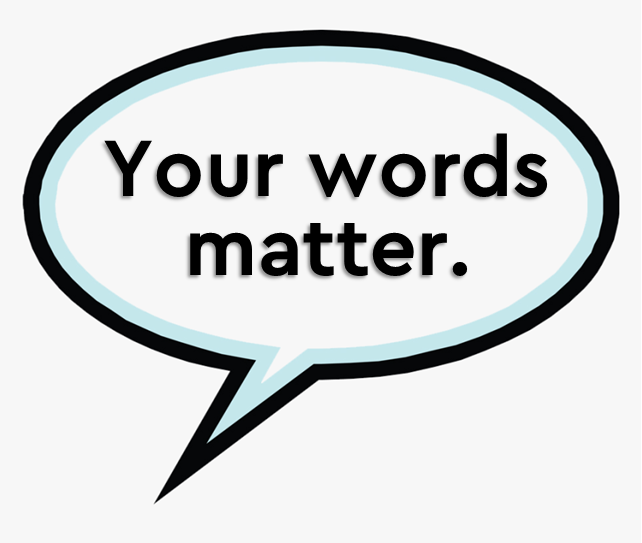




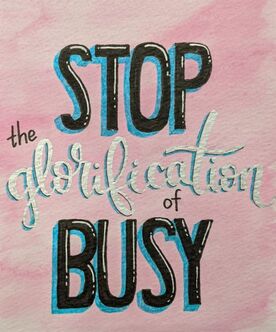
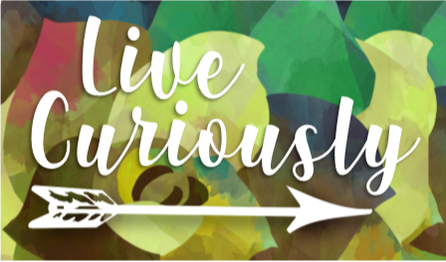




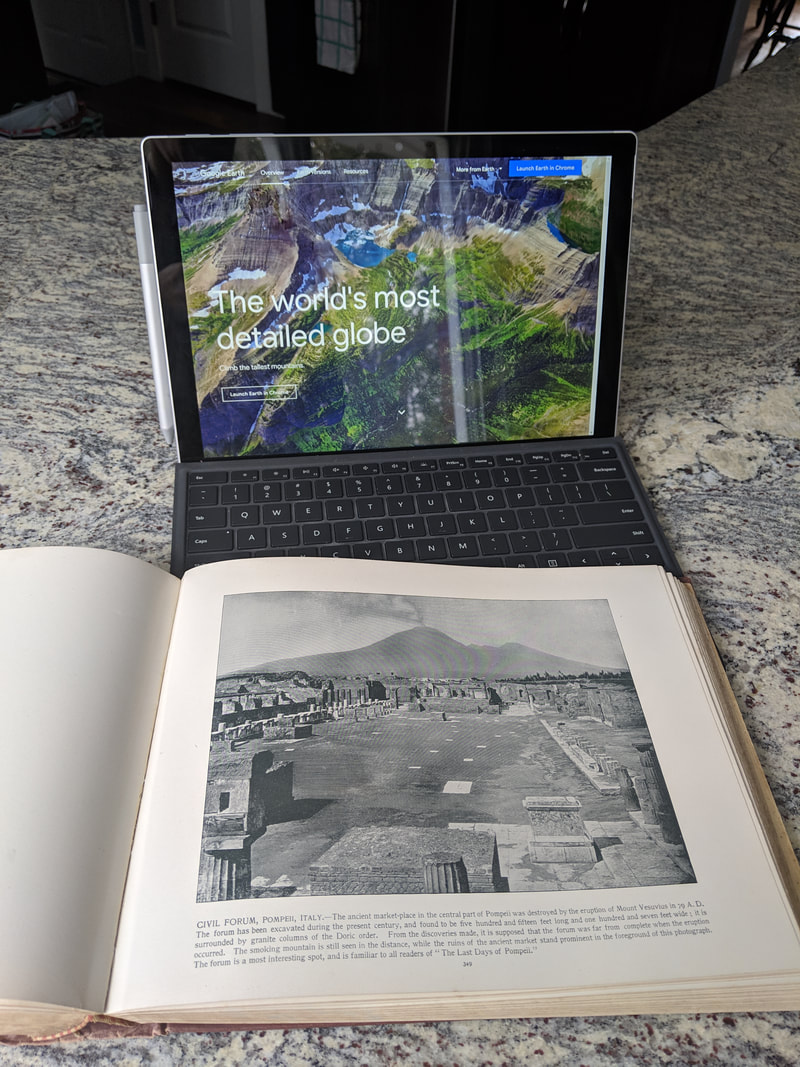
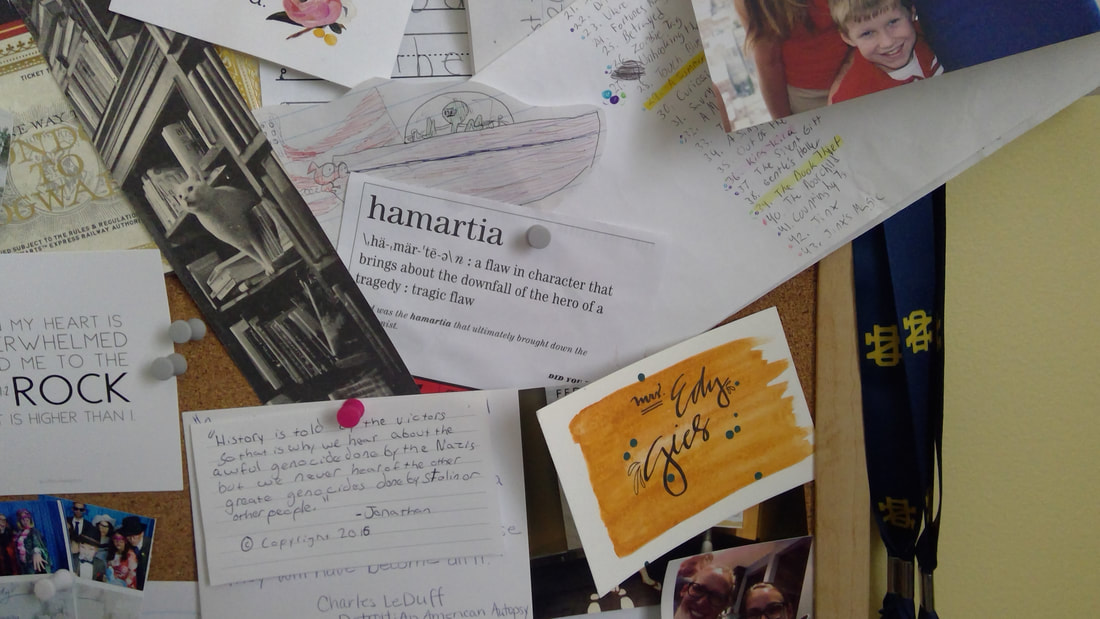
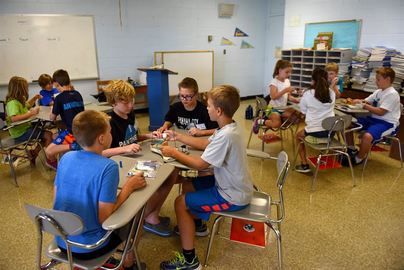

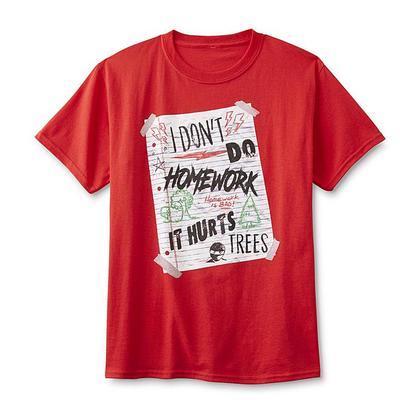
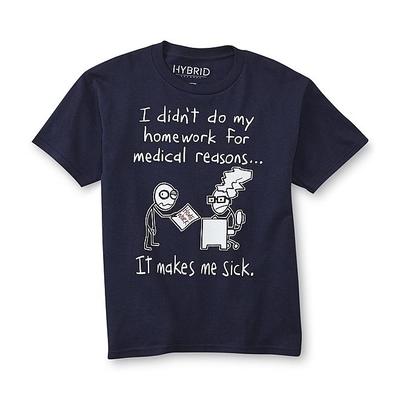
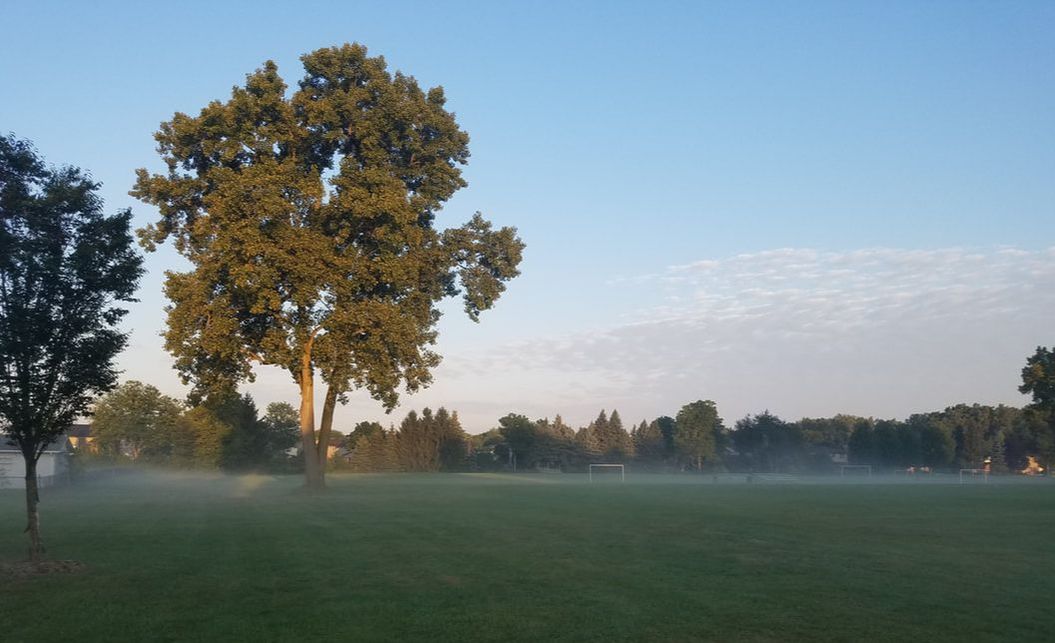

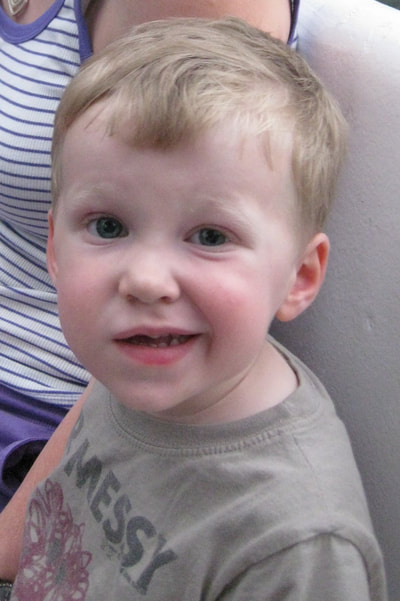
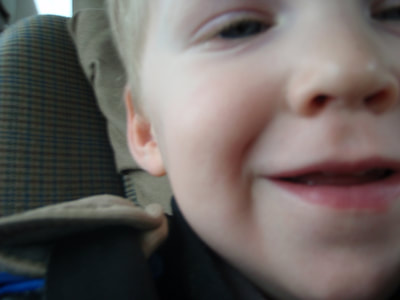



 RSS Feed
RSS Feed